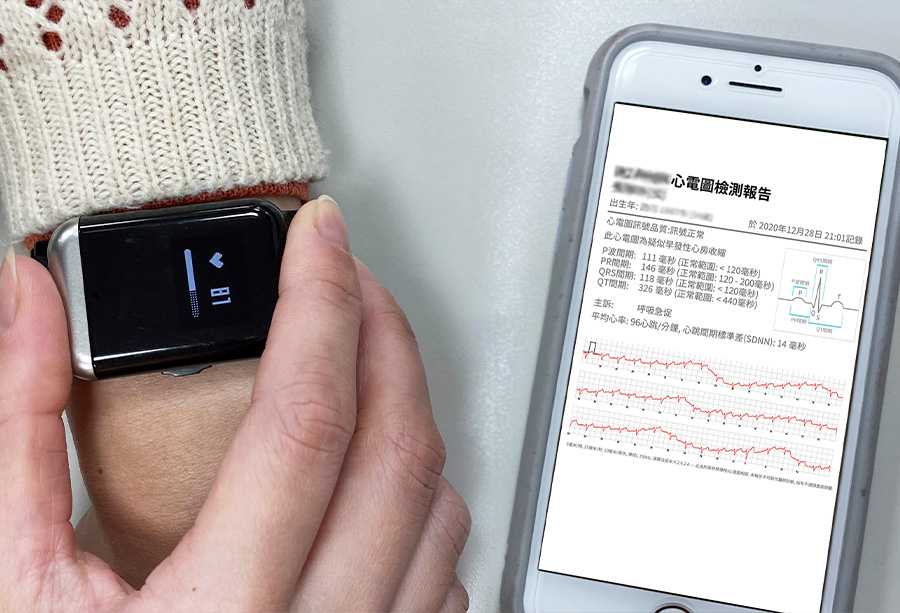“Taiwan's Pineapple is No Inferior to American Apples” Taiwan Excellence Award ECG Watch, Preventing Myocardial Infarction and Stroke
This year, with cold fronts sweeping in one after another, the incidence of myocardial infarction and stress-induced sudden death has risen sharply. Dr. Qiu Chun-zhi, Director of the Cardiology Department at Shuanghe Hospital, reminds that people with diabetes, hypertension, and other high-risk groups, as well as those with arrhythmias, are at high risk for cardiovascular diseases and should take proper care and measure their ECG and other vital signs daily to detect potential issues early.
Cardiovascular diseases are the second leading cause of death in Taiwan, with coronary heart disease being one of the main causes. New patients are diagnosed every day. However, issues like angina or arrhythmias (including atrial fibrillation) occur intermittently and often present no symptoms at the time of medical visits, making diagnosis more difficult. Therefore, long-term home monitoring plays an important role in follow-up care. After coronary stent implantation, there may be restenosis, and without precise monitoring, myocardial infarction, heart failure, or even stroke could occur, leading to repeated hospitalizations, surgeries, or even disability, placing a significant burden on patients and healthcare costs. In fact, in Taiwan, there is a medical-grade wearable ECG recorder watch that obtained ECG measurement certification from the Ministry of Health and Welfare even earlier than the Apple Watch. It supports both Android and iOS users and has received the Taiwan Excellence Award. Currently, it is being used clinically by Shuanghe Hospital. Unlike the traditional home testing method, which lasts up to 14 days, the new wearable ECG recorder watch used by Shuanghe Hospital allows patients to monitor ECG and various arrhythmias (including atrial fibrillation, which can lead to stroke) 365 days a year. Additionally, it actively detects irregular risk indicators every half hour while worn.
For patients at high cardiovascular risk, Dr. Qiu Chun-zhi shared on his personal LINE@ that a patient undergoing treatment for coronary heart disease, after following advice, used the wearable ECG recorder watch at home to measure their ECG and uploaded the data to the health management platform daily. One day, a research assistant noticed "abnormal" data over several days on the health management platform and promptly reported it to the attending physician. After interpretation, it was determined that the patient had likely developed atrioventricular block. The patient was advised to return for a check-up, adjust their medication, and receive related treatment. Two weeks later, the patient returned, and after further diagnosis and discussion, it was confirmed that their condition had improved. Although the patient had regular check-ups, if not for the early warning provided by the wearable ECG recorder watch, the diagnosis could have been delayed, which could have worsened the condition.
Dr. Qiu Chun-zhi further explained that human heart rate conditions are influenced by the environment, emotions, and diseases. Recently, the heart team at Shin Kong Hospital analyzed health information from residents in the Jinshan area and found a close correlation between heart rate variations and mortality rates. Long-term ECG monitoring data helps doctors understand abnormal frequencies and the duration of these issues, enabling more comprehensive assessments of the condition, early intervention, and reduced readmissions and medication usage. Dr. Qiu emphasized that if any discomfort arises, patients must seek the final diagnosis and treatment from clinical professionals, and avoid self-diagnosis or relying on unverified remedies that could delay the critical moments for rescue.

Image: The wearable ECG recorder watch, recognized with the Taiwan Excellence Award, supports both Android and iOS users, allowing them to download the corresponding app.

Image: Dr. Qiu Chun-zhi, Director of the Cardiology Department at Shuanghe Hospital, reminds that people with diabetes, hypertension, and other high-risk groups, as well as those with arrhythmias, should take proper care and measure their ECG and other vital signs daily to detect issues early.